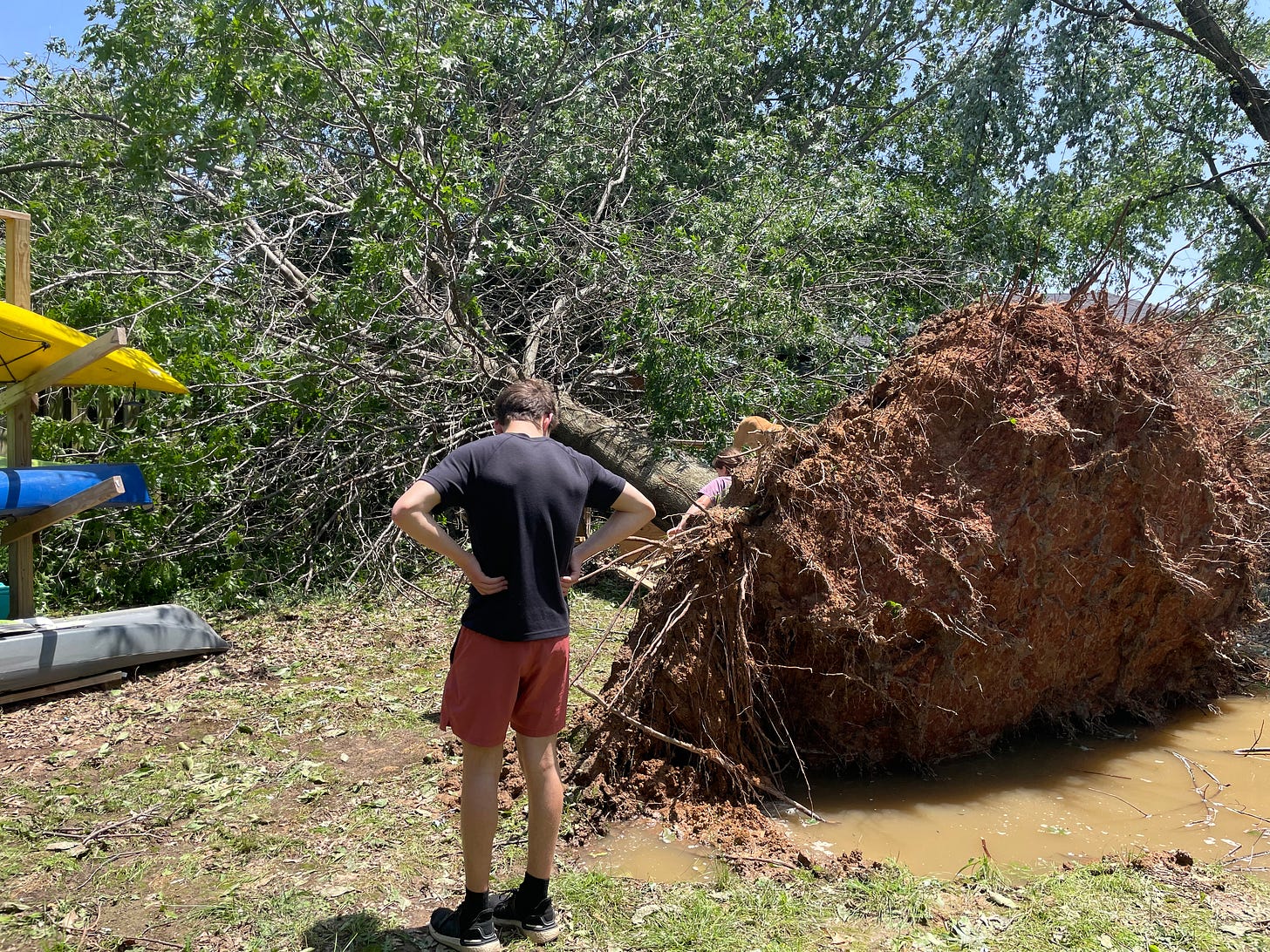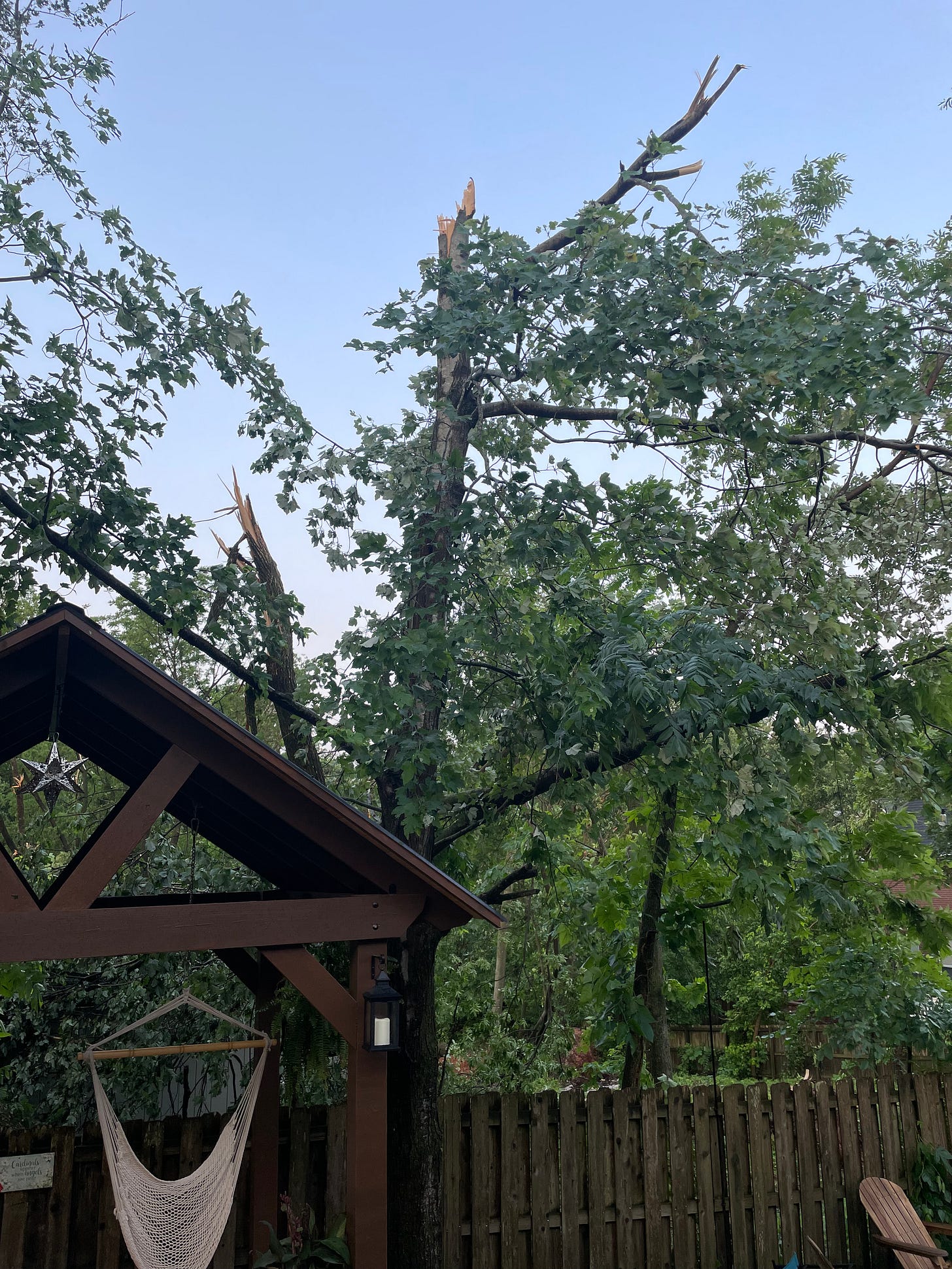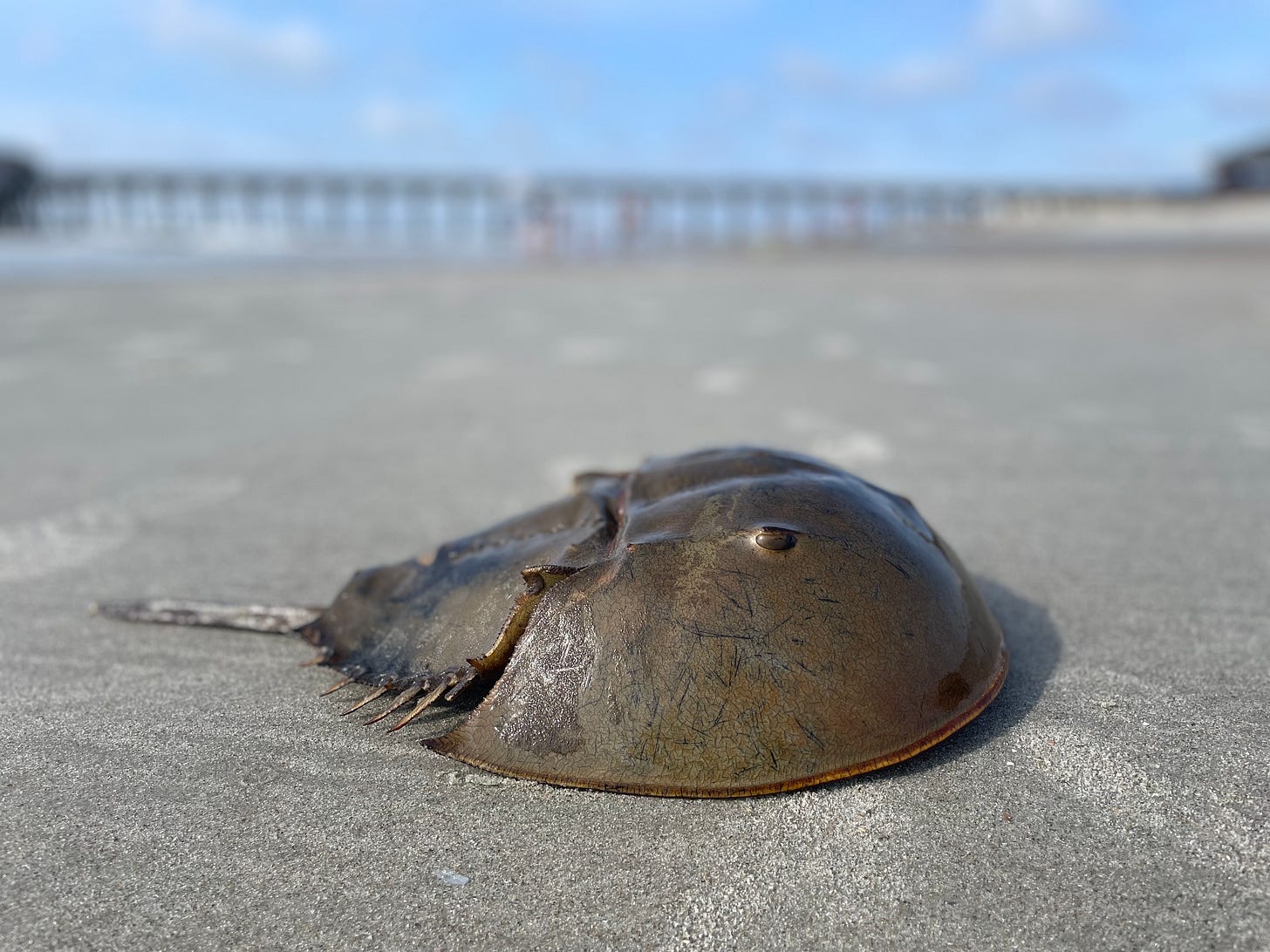None of this is ours to keep
A meditation on loss, learning, and presence
Good morning friends! It’s been over a month since my last post, and for good reasons, so I thought I would reach out with a quick update on “the days of our lives,” as it were.
On May 26th, 100-mile-per-hour winds and seven tornadoes ripped through Northwest Arkansas. Our little town of Bentonville lost many of its oldest and grandest trees—a tragedy for the downtown area. Nearby towns lost homes, businesses, and even lives. My best friend (also a writer on Substack,
) lost a massive pin oak, as well as hundreds of branches and parts of trees that we spent the next day helping to clean up. She wrote a beautiful post and poem about her experience with that tree, called “The Scent of Transformation” here.We only lost half a tree, which fell mostly in our neighbor’s yard. The only damage to our home was a dented metal roof on the little gazebo we built in our backyard—the result of the recoil of the tree after it snapped midway between its trunk and crown. It was a young tree. A teenager as trees go, and a strange omen for a tragedy far worse.
Last week, our daughter’s boyfriend was killed in a motorcycle accident. Because Substack is such a public space for me, I won’t publicize her name or pictures. I’ll call her Mary, (for the artist Mary Cassatt, because she is an artist too). But I will mention his. His name is Bryce. He had just graduated from high school with high honors. He was handsome, bright, driven, and oh so very kind. Every time he walked into our house to see our daughter (I say daughter, even though she is my step-daughter and Joseph’s daughter, because I have come to love her so), he stopped a moment to chat with us, engaging in a way few young men do these days. He was the sort of young man who squeezed a little when he shook your hand, looked you right in the eye, and took the time to let you know that he intended to take good care of this young woman he had fallen in love with.
And oh how we loved him for the way that she bloomed in the light of his love. The move to Arkansas was a hard one for her. She had long struggled with depression and self-isolation, and here she had to start over from scratch. But she was quiet and shy, and tended to stay in her room except for school and work. But he saw her, pursued her, and finally woke her up to the fact that he really really liked her. Just a few nights before he died, he came over to take Mary out. Joseph asked him where they were off to and he answered with a certain joie de vivre that we will never forget, “We’re headed out on the town!” And here she was with him, “going out on the town” and smiling more than we had seen her smile in years.
When she got the news, she came instantly to her dad. I had been outside tidying up a little in preparation for our two-week vacation to the East Coast. I came inside and found Mary sitting on the bed with Joseph. He had his arm around her, and she was weeping, rocking back and forth, her face in her hands. Joseph mouthed the words, it’s Bryce.” I instantly thought they must have broken up, and I knelt down next to her feet, ready to comfort her and to tell her everything was going to be okay. Then I looked up into Joseph’s eyes, and asked, “Did they break up?” I’ll never forget the look in his eyes, a mixture of confusion and shock. Then he whispered, “he’s dead.”
The next three hours are emblazoned on my mind. Joseph and I held Mary as she grieved for lost love. I held her knees for a while as she rocked and sobbed and covered her face with her hands, muttering incoherently. I caught only a few words: no, he didn’t, and he couldn’t. After about an hour of this, I encouraged her to move to the floor, where we could all lean our backs against the bed and continue the work—for grief is work. It took her whole body in its power, and we held her like a babe as she cycled through shock, anger, denial, and confusion—everything they tell you about when you learn about the stages of grief. I tried to get her to drink some water, but even that was difficult for her.
Strangely, it felt almost exactly like my days as a birth doula, holding women through the hard labor of labor. I knew that there was no comforting her except to hold her. No words to say, except for I’m sorry, we’re right here, and breathe. In that moment, words like, “it’ll be okay” seemed hollow, and efforts to get her to calm down seemed useless and wrong. In fact, I recognized her tears, rocking, and sweat as essential. In the same way a woman’s body knows how to give birth, her body knew how to grieve. And I knew there was nothing to circumvent or stop. The only way out of this moment was through it.
It took three hours of hard grieving before her troubled waters suddenly grew still and she was able to utter the words, “I need to talk to Kayla” (her older sister). Here too, she knew what she needed. We dialed her sister and gave her space to talk alone. When Mary emerged from the bedroom, she said she was tired and needed to sleep.
I’m writing these words from the ocean. We decided to come anyway, hopeful that the beach and the sun would be helpful to Mary. I think it was. She stayed for a few days and flew back yesterday for the funeral. I’m here with the rest of the kids, trying to continue living life while holding reverence for Bryce’s memory.
This morning I walked out to the beach early to stretch and think. While I was meditating, a monstrous horseshoe crab shell washed up onto the shore. I walked over and bent over it, along with several other women. “The horseshoe crab is one of the most ancient creatures on this planet,” one of them remarked. “older than the dinosaurs, and mostly unchanged, even after millions of years, and it’ll probably still be here long after humans are gone.”
I reached out to touch it, and to keep it from washing back into the ocean. It felt light and I realized that the body of the crab was gone. Only the shell remained. The other women continued their walk down the beach, so I picked up the shell and brought it away from the waves so I could have a better look (and take a picture or two). Then I sat down with the crab, staring at its shape—its ridges and smooth places, its roundness and symmetry, the life it once held—and I thought about Bryce. And his parents. And Mary. In all the loss of the last month, through the tornado, and through Bryce’s death, which ripped through our community with equal force, I was always adjacent—never fully in the loss. Better able to help, I suppose. But now, this ancient animal helped me to feel everything. For a moment, I plugged into something ancient, and into something very human. And I wondered if horseshoe crabs ever feel anything like grief, or whether the cycle of life and death is experienced as loss, or simply what is.
I wanted to keep the shell. I wanted to carry it back to our condo and show it to the kids. Preserve it somehow, like the flowers that Bryce gave to Mary the day before he died. Blue baby’s breath, it was. He knew what she loved. But something stopped me—not just a wave of intuition, but a literal wave that reached so far up the shore that I had to scramble to snatch up my towel and my bag, which had sat there dry for the last hour. The tide was coming in to take the horseshoe crab back to the sea.
“This is not yours,” said the ocean. “This belongs to me.”
One more random thought before I finish here. Yesterday, as we took refuge in the condo after too much sun, my youngest son was watching Bluey. I was sweeping sand up from the floor as I listened to the plot unfolding. Bluey was eating ice cream, but he wasn’t eating it fast enough, so it melted in the summer sun. Bluey cried out, claiming the unfairness of the loss and demanding more ice cream. The father, not unkindly, said, “No way,” adding, “This is a valuable life lesson.” To which Bluey retorted, “I don’t want a valuable life lesson. I just want ice cream.”
We humans, we cling to things so tightly. We don’t want our valuable life lessons. We just want our goddam ice cream. We just want our trees, that we thought belonged to us, and that we thought would stand forever. We just want our children, whom we cannot fathom outliving. We just want our past, with all of its memories and triumphs, its hurts and traumas. And we just want our futures that we have so meticulously planned out for ourselves.
But like it or not, nature keeps teaching this valuable life lesson—that none of it is ours to keep. The cycle of life and death pleads with us to be present within the change. To sit with the uncertainty. To hold each other in our grief and to help each other in our loss. To eat our ice cream before it melts. We, all of us, are forced into waves of transformation, and we must learn to ride the top of the waves rather than be pulled into the undertow. In the words of Ram Dass, we must “Be Here Now.”
So now, I’m going to take my son swimming. He’s waiting for me so patiently. I’ll catch up with you all on the other side.






Your skill in writing moves me to tears in a good way. And causes me to self evaluate. Excellent
I am sorry for your family’s loss. And thank you for showing and helping tato be human again. In living and grieving.